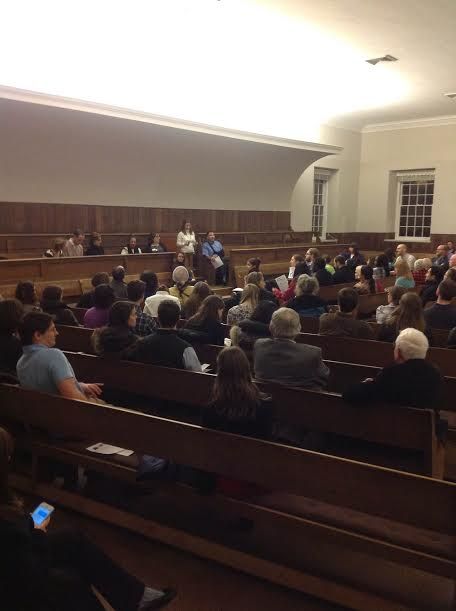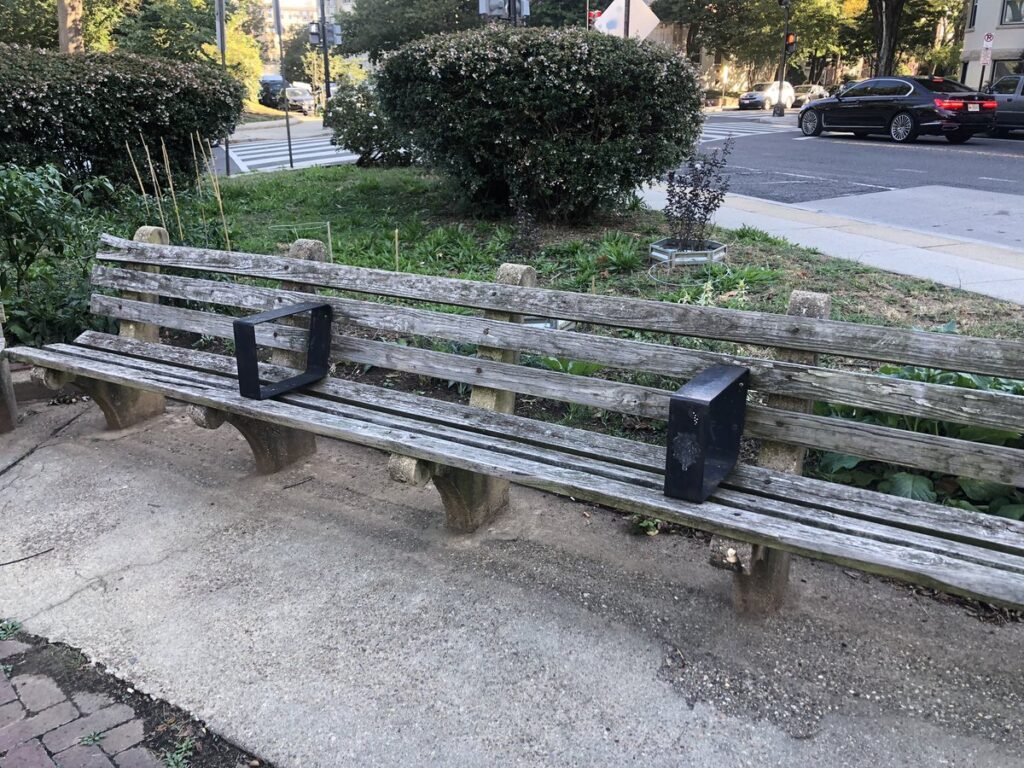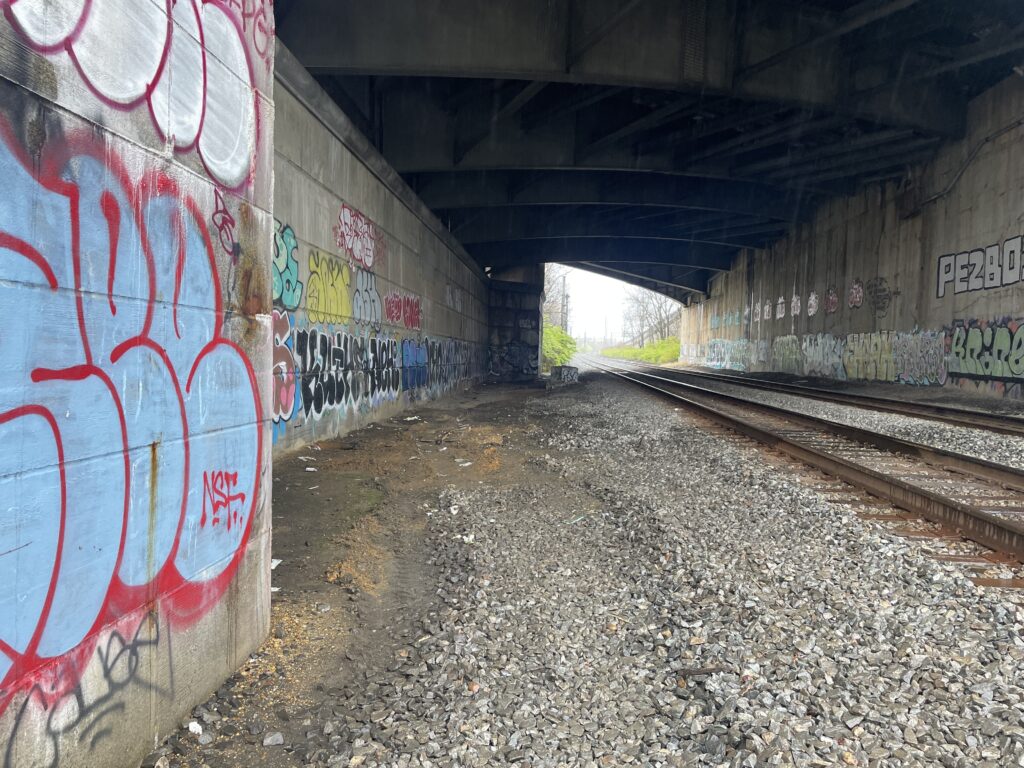Preparing to speak as a panelist for a recent community forum, Angie Whitehurst seemed nervous. There was a big crowd. Terry Nicoletti reminded Whitehurst to look up toward the back of the room and move her head from left to right so the audience would feel like she was talking to them.
Whitehurst, a Street Sense vendor, spent two years “unhoused,” as she prefers to call it. During that time her struggle with depression and anxiety were exacerbated. She found it very difficult to get mental health care, as she was uninsured.
“I want people to understand what it sounds like,” Whitehurst said. “They can’t feel it. They can’t touch it. I want them to feel it through my words.”
Whitehurst hoped to motivate the audience into action.
“Maybe it’ll increase their awareness and then they’ll say ‘I need to do something,’” she surmised.
On Jan. 27 Street Sense addressed these issues with a forum and networking event at the Quaker Meeting House near Dupont Circle, part of the organization’s “Lessons of Hope” series. Coordinator of New Initiatives Rachael Buck orchestrated the talk along with 20 other volunteers.
There were tables set up representing homelessness advocacy groups before and after the forum, hoping to connect with some inspired prospective volunteers. Lessons of Hope is all about education and motivation, according to Buck.
Executive Director Brian Carome opened by telling the story of a homeless man named Max, dealing with mental illness, who died in the woods waiting for shelter. Carome set a tone of deep concern, but also voiced the belief that the problems faced by mentally ill and homeless people could be identified and solved. Max’s Place, a permanent supportive housing center in Fairfax County for adults with mental illnesses, was founded by New Hope Housing in Max’s honor.
The forum was moderated by Kate Sheppard, a senior reporter at the Huffington Post, who questioned four experts on mental health and homelessness.
The availability of mental health services and medications is limited for homeless people, according to Michele May, Director of Forensic Services at the D.C. Department of Behavioral Health. Celeste Valente echoed this sentiment, saying that Medicaid does a lot of good but doesn’t cover everything. Valente is one of the founding members of Open Arms Housing, a low-barrier permanent housing group for women. She recalled often being told, “We can’t bill for that.”
Whitehurst described the difficulty of moving from one doctor to another. She advocated for medical and mental care to be provided in one place, especially now that there are no pay phones on the street.
“Without a cell phone, you’re up the river,” Whitehurst declared.
May emphasized that homeless issues are not just about services. According to her, part of understanding homelessness is learning that homeless people are like everyone else.
“Everybody has feelings, they fall in love, they want a place to live for the rest of their lives,” May said.
The forum explored myths about mental health and homelessness, alongside the challenges and possible solutions.
“One myth that has to be addressed is that people can’t recover,” Valente said.
Jake Bowling, director of Practice Improvement at the National Council for Behavioral Health, suggested that many people think mentally ill homeless people must be forced to take their medication because they don’t want it.
“One I’ve heard is that people just want to be homeless,” May added. She explained how challenging it is to change one’s life while experiencing homelessness.
“It’s very difficult to go to job interviews and get your life together when you’re carrying your life on your back,” May said.
Whitehurst helped to show people the humanity of homelessness by sharing the story of what she called the two longest years of her life. The first night she spent on the street was in February.
“It was freezing and I had no idea where to go,” Whitehurst reflected.
She also had difficulty receiving any mental health services.
“I tried everything. I applied to Medicaid, every D.C. mental health care program there was, and 20 to 30 different mental health for homeless not for profits,” Whitehurst said.
Whitehurst didn’t seem to fit the programs’ requirements, commonly age and geographic location. Sometimes she was just turned away, Whitehurst said.
During the Q-and-A session toward the end of the event, most people were asking similar questions: “What are some things people here can do to help?,” “Which programs should we support?,” “What can the media do to cover these issues better?”
Valente urged the audience to contact city government, especially because the mayor is new. She encouraged voting and attending meetings that discuss homelessness.
“We have a city council that is accessible. You can knock on their door and talk to them,” Valente said.
Whitehurst urged people to make change. According to her, everything that can be done, doesn’t always cost money. According to May, the first step is volunteering at shelters and soup kitchens.
“The insight that comes from past experience is invaluable,” Bowling agreed.
The forum’s community partners, hoping for new volunteers, included the District Alliance for Safe Housing, The Way Home Campaign, Open Arms Housing and Christ Church. All spoke quickly to introduce their organizations and present opportunities to get involved.
The next Lessons of Hope forum is planned for April 2015 and will focus on family and childhood.
“We should help each other, we are a society,” Whitehurst concluded and was met with applause.








